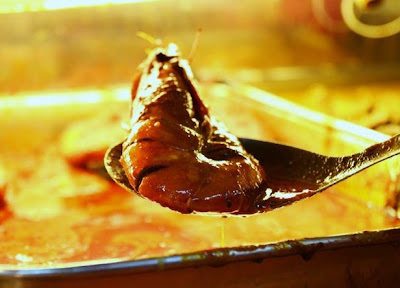The origin of "Nasi Kandar" is an Indian Muslim dish and an icon in Penang island. It is a meal of steamed rice which can be plain or midly flavoured with Indian herbs, served with varieties of "gulai" (curries) and side dishes. The word Nasi Kandar came from a time when "Nasi" (rice) vendors would "kandar" (balance) a pole on their shoulder with two huge basket of rice meals. The rice is accompanied by side dishes such as fried chicken, beef curries, fish curries, prawn curries or squid. The vegetable dish would usually be aubergine or lady fingers (okra). Nevertheless, the chosen mixture of curry sauces is poured directly onto the rice. Today, the word Nasi Kandar is seen on most Indian Muslim or "Malaysian Mamak" restaurants, serving up business of 24 hours a day.
We Penangites grew up eating nasi kandar for breakfast, lunch, dinner and even supper. My colleagues and I would grab a meal of Nasi Kandar after work at 4 or even 5 in the morning. We would just chilled out in the restaurant drinking local coffees or teas, gossiping bout the work while enjoying the big plate of rice with lots of curries flooding on top of the rice. Those were the days of Nasi Kandar.
 |
Appetiser of "Popadum"
|
 |
| "Lady Fingers" (Okra) |
 |
Deep fried Chicken local style
|
 |
Beef Curry
|
 |
| "Sotong" (squid) curry |
 |
| Prawn curry |
 |
| Nasi Kandar - the finest creation |
(Beautiful pictures contributed from buddy Immy and Nasi Kandar restaurant researcher Poay Lai from our beautiful Penang island)










No comments:
Post a Comment